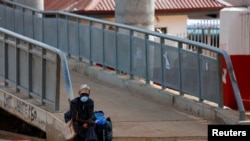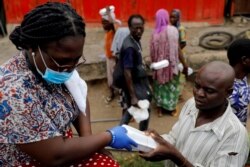As residents in Ghana’s capital, Accra, are told to stay indoors to help combat the spread of COVID-19, government and city authorities are tackling the waste that sits in open drains or in piles on streets.
For decades, Accra has had major issues with its waste management. Demand for services has not kept up with population growth. Research shows about a quarter of the trash Accra generates is not collected. It ends up an eyesore, littered through the streets, in drains, on the beaches or is burned by residents.
The city’s sanitation issues have been linked to annual flooding and have had health and economic consequences.
In 2017, Ghana’s President Nana Akufo-Addo pledged to make Accra Africa’s cleanest city.
This weekend Ghanaian authorities have been cleaning the city while it is under a partial lockdown. Ghana has 214 confirmed cases of COVID-19, most in Accra.
The point of the exercise this weekend, initiated by Ghana’s Ministry of Sanitation and Water Resources, was to clear public spaces of accumulated refuse, to set a national standard for city cleanliness and to support the fight against the COVID-19 spread, the ministry’s director of sanitation, Anthony Mensah, said.
The exercise is a joint effort between local and central government and the private sector.
Ghana’s national security services personnel were also part of the efforts, and images shared on social media showed them clearing out open drains in the city.
With the empty streets, Accra’s Mayor Mohammed Adjei Sowah said the lockdown proved an opportune time to focus on the central business district, he told VOA by phone.
The exercise was not a silver bullet in attaining the president’s goal, Sowah said, but it was part of continuing work to clean up the capital.
“Significant efforts have been put into maintaining sanitary conditions in the city center, we know we are not there yet, but there has been significant improvement in the city center,” said Sowah.
Richmond Kennedy Quarcoo, co-founder and president of NGO Plastic Punch, which raises awareness on the dangers of plastic waste and promotes sustainable waste management solutions, told VOA he was impressed to see residents also take part in the exercises.
“It is the opportunity for local assemblies to keep their environments clean, considering the pressure which might come on all our health facilities. It is the best way to prevent sanitation-related diseases, so it is surely a step in the right direction to keep it clean and also have a feeling of what a clean Ghana will be like,” he said.
Quarcoo, who spoke to VOA via a messaging application, said there are drastic differences across Accra’s neighborhoods in cleanliness and access to services. While the weekend cleanup efforts were a good start, Accra needs more focus on investment, access, education and awareness for long-term improvements, he said.





